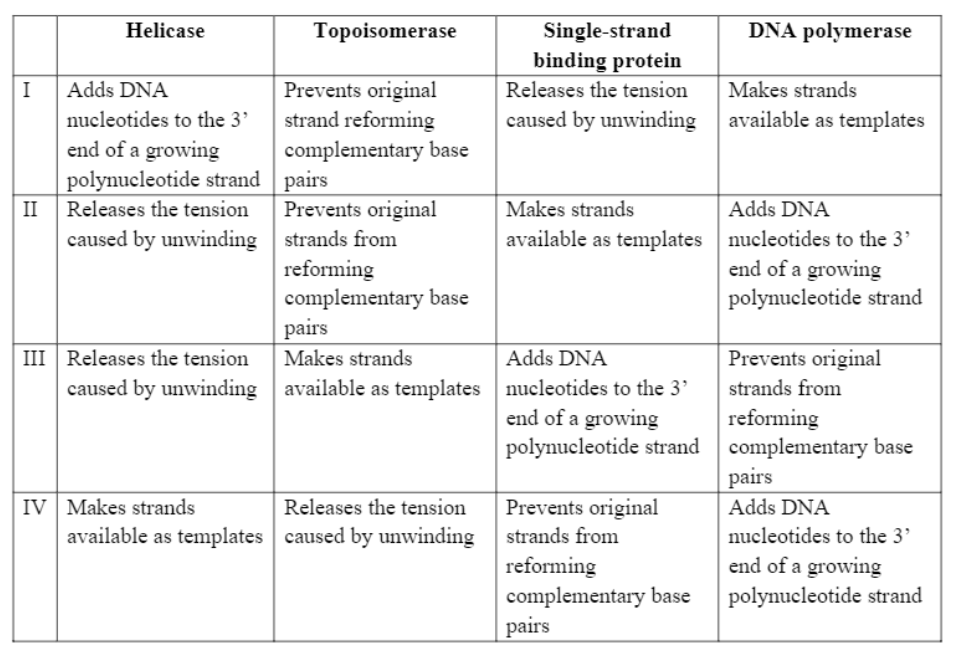The function of an enzyme is to
cause chemical reaction
change the rate of chemical reaction
change the equailibrum
change the directions of reactions
The correct Answer is:B
To answer the question "The function of an enzyme is to," we need to analyze the options provided and understand the role of enzymes in biochemical reactions.
1. Understanding Enzymes: Enzymes are biological catalysts that speed up chemical reactions in living organisms. They are primarily proteins and are crucial for various metabolic processes.
2. Evaluating the Options:
- Option A: Cause chemical reaction: Enzymes do not cause reactions to occur; they facilitate reactions that would happen anyway but at a much slower rate.
- Option B: Change the rate of chemical reaction: This is a correct statement. Enzymes increase the rate of chemical reactions by lowering the activation energy required for the reaction to proceed.
- Option C: Change the equilibrium: Enzymes do not change the equilibrium of a reaction; they only help reach equilibrium faster.
- Option D: Change the direction of the reaction: Enzymes do not change the direction of a reaction; they only speed up the reaction in the direction it is already going.
3. Conclusion: Based on the analysis of the options, the function of an enzyme is best described by Option B, which states that enzymes change the rate of chemical reactions.
Final Answer:
The correct answer is Option B: Change the rate of chemical reaction.
---
- Option A: Cause chemical reaction: Enzymes do not cause reactions to occur; they facilitate reactions that would happen anyway but at a much slower rate.
- Option B: Change the rate of chemical reaction: This is a correct statement. Enzymes increase the rate of chemical reactions by lowering the activation energy required for the reaction to proceed.
- Option C: Change the equilibrium: Enzymes do not change the equilibrium of a reaction; they only help reach equilibrium faster.
- Option D: Change the direction of the reaction: Enzymes do not change the direction of a reaction; they only speed up the reaction in the direction it is already going.
The correct answer is Option B: Change the rate of chemical reaction.
Topper's Solved these Questions
- ANIMAL TISSUES BOOK - TRUEMEN BIOLOGY ENGLISHCHAPTER - ANIMAL TISSUES EXERCISE - MULTIPLE CHOICE QUESTIONS
193 Videos
- CELL- THE BASIC UNIT OF LIFE ( CELL AND ITS STRUCTURAL ORGANISATION )BOOK - TRUEMEN BIOLOGY ENGLISHCHAPTER - CELL- THE BASIC UNIT OF LIFE ( CELL AND ITS STRUCTURAL ORGANISATION )EXERCISE - MULTIPLE CHOICE ANSWER TYPE
308 Videos
Similar Questions
The function of enzymes in the living system is to
View SolutionThe function of enzymes in the living system is to
View SolutionA metal ion required for normal functioning of an enzyme is
View SolutionWhat is the function of enzyme nuclease in the pancreatic juice?
View SolutionThe lysosome contains hydrolytic enzymes. For the functioning of enzymes , the pH inside the lysosome is
View SolutionTemperature range for maximum functioning of enzymes is
View SolutionWhich of these options correctly represents the functions of all these enzymes ?

View SolutionWhich of these is the correct function of enzymes/ Protein used in DNA replication ?

View SolutionWhat is the effect of an enzyme in an enzyme-catalysed reaction?
View SolutionMention only two functions of enzymes.
View Solution
